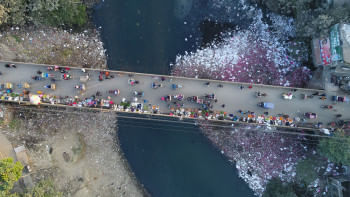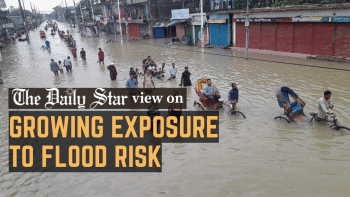Chalan beel is fast degrading to a tipping point

It is appalling how we have allowed unplanned development, encroachment, dumping of waste, and over-extraction of groundwater to strangle life out of the largest wetland of the country: the Chalan beel. The beel once provided subsistence to thousands of farmers and fishers in North Bengal. But in just over a century, according to a report by this daily, its size has reduced from 1,085 square kilometres to a mere 168 sq km, with its biodiversity largely destroyed and groundwater sources almost depleted.
The gradual decline of many of the rivers and canals that feed water into the beel caused its alarming decline. Those rivers too have been subjected to encroachment, construction of unplanned sluice gates, and mindless waste dumping. Lack of dredging is another issue. Despite repeated media reports in this regard, no effective measures have been taken by the government. Instead, the government itself built structures and set up projects, especially on Boral river's land, the main water source of Chalan beel. Although some ad hoc steps were taken to remove some of the structures on the Boral, based on a 2018 study by the water resources ministry, no long-term coordinated action has been taken to restore the navigability of the river, and consequently, the beel continued to dry up.
Several government agencies are responsible for the protection of our rivers and wetlands. It is, however, clear that no one is doing their job right. While the ill-equipped Department of Environment has done nothing to protect the biodiversity of Chalan beel, the fisheries and livestock ministry did not think twice before giving permission for pond excavation and fish farming. No action was taken to penalise illegal enclosures harming the beel's natural environment. The local administration and other responsible agencies too kept on turning a blind eye to the unplanned roads, bridges, culverts, regulators and sluice gates constructed through the beel and its network. Unfortunately, it is not the only victim of the government's sheer apathy in protecting our wetlands. We have seen several other beels being subjected to the same fate.
This needs to stop. Government agencies must work together, and develop and implement long-term projects to save this precious wetland and others. They must also preserve the networks of rivers and wetlands breathing life into our delta.


 For all latest news, follow The Daily Star's Google News channel.
For all latest news, follow The Daily Star's Google News channel. 










Comments